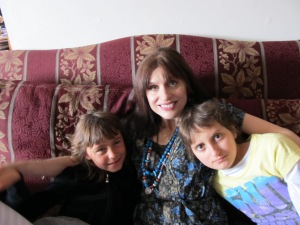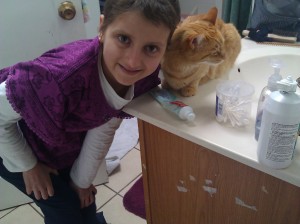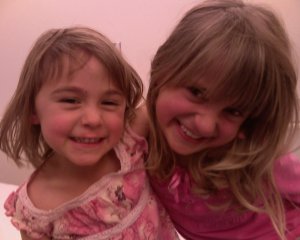What Bereaved Parents Want From You
There’s an article in the New York Times written by a bereaved mother that mirrors in exquisite detail my own feelings — the difference is that the author is braver than I. Her account of her behavior in the aftermath of her teen daughter’s death is unflinchingly honest, lurid and shocking.
In the article,* K.A.Leddy writes of dashing to another aisle in the grocery store if she spotted a neighbor or someone from her children’s school in the early months of her bereavement. If that same person was seen again, she would pick up whatever food was closest and “appear to be engrossed in its label.” If that failed and she found herself cornered, she would abandon her cart and dart for her car. She could have been writing about me. I don’t think I attempted the supermarket in the early months following Natasha’s passing, but I remember taking my surviving daughter to the playground, covered up like an aging Hollywood starlet who had just had “work” done to her face and wanted to dodge the paparazzi: my hat, scarf and large sunglasses were my shield. At other desperate times, I’d reserve those trips for after dark (that meant I had to forgo the sunglasses, but the likelihood of seeing an acquaintance would be lower).
Both Leddy and I are far from unique, judging from the flurry of letters that followed her article. “Rachel’s mom” confided that visits to the grocery store became “a horrible detour through a haunted house … a harrowing excursion;” a reader from Israel whose teen daughter was killed in a terror attack 12 years ago, said she still switches aisles and scrutinizes can labels to avoid people in supermarkets; and another bereaved parent compared the early days of grief with being in the mafia: “I didn’t enter a room at a gathering without first ascertaining that I could quickly reach an unobstructed exit, the minute I needed to escape.”
Reading about these experiences has made me feel a little less alone — maybe my own avoidant behavior wasn’t (or isn’t?) so bizarre — but I’m sure that these comments must be perplexing for the non-bereaved. After all, aren’t they supposed to reach out to us rather than shun us?
I think most of us get it wrong when we approach the bereaved. And I’m including myself in “most of us” (although I hope that I know better now).
Years ago, when cancer was a word that was rarely uttered in our household –- why would it be, both of our kids were apparently healthy — an elderly relative who lived in a different state had passed away. She was in her early 90s and according to family lore, was “ready.” I picked up the phone to offer condolences and was pleasantly surprised to hear the voice of her daughter — someone we’d enjoyed dinner with a few years ago.
“Ann, how lovely to hear from you!” I gushed. There was a silence on the end of the phone. “How are you?” I continued, bubbling with enthusiasm. There was another pause. “I’m not doing too well,” she said, her voice low and flat.
Flummoxed that I’d mishandled the conversation, I quickly tried to remedy my errant cheerfulness by resorting to a wearied cliché: “Well, let me know if there’s anything you need.”
Clumsy and inept as I had been, others were worse, according to readers of Leddy’s article. One mother, whose weeks-old son had died, was “comforted” by another new mother with these words: “Well, it’s so much work to take care of an infant — at least you don’t have to deal with that.” Months later at Christmastime, the same mother sent a “bucolic Christmas photo of her with baby,” accompanied by a letter extolling the delights of parenthood. At the bottom, she had written, “Thinking of you.”
“To this day, I can barely say her name aloud,” she wrote.
Another parent who had lost an adult daughter was told that her death was “such a shame, considering all the money spent on her education.”
Not all readers that responded to Leddy’s article were gracious. One reader said that every effort to say something comforting to the newly bereaved should be appreciated. I disagree. I think we need to say far less and listen far more.
Leddy describes an impromptu meeting with an acquaintance who had greeted her with nothing more than a tight wordless hug. That hug, she says, allowed her to “slowly exhale.” This was someone who had “gotten it exactly right.”
I’ve been the recipient of one or two of those silent hugs, myself. On one occasion early on in my loss, I was walking home after picking up my surviving daughter from school when I saw a casual friend whom I’d known for more than a decade approach me. Where to run? Crossing the road would look ridiculous and how would I explain this to my child? Could I pretend that I had forgotten something and abruptly turn back to school? No, that would look weird, too, and besides I might run into someone else. I was trapped.
I braced myself for a litany of phrases that I was used to hearing: the upbeat “How are you?” (said in a way that almost demanded that you respond with a, “Great, thanks!”), the cookie-cutter, “Let me know if there’s anything you need,” and worst of all, “When my mother/dog/sister/grandma passed away, I …”
I kept on walking toward Jennifer, head down. But this time no words were exchanged. Jennifer wrapped both arms around me, looked deeply and briefly into my eyes and moved on. Like the acquaintance of Leddy’s, she had “gotten it exactly right.”
Not everyone’s comfortable with a hug, but most bereaved parents know that kind gestures can speak louder than words. The gentle smile, the brief touch of the arm, the flowers left on our doorstep on our late daughter’s birthday — those actions let us know that these people are “listening” even when we don’t speak. One day we might be ready to talk to them.
*K.A.Leddy: “Ducking Grief” http://www.nytimes.com/2013/10/22/booming/ducking-grief.html?_r=0

To receive e-mail notification from WordPress after each new post of The Mourning After Natasha, please hit the “Following” button. WordPress will ask you for your e-mail only.


One friend, trying to comfort me while I was still pregnant with Sam and had just found out my husband, Michael, had end stage cancer, said, “Well, at least you’ll have the baby.” Another friend said to me just after Sam’s passing at six-days old, “Well, he was premature, so at least you don’t have to go through all the problems associated with that.” I’ve learned never to make “at least” comments about any situation someone is going through. Because the idea that it “could be worse, so at least it’s not…. ” is not comforting.
Thanks for saying that, Tamrakat. I’m sure I used to say stupid things like that, too …
My friend whose daughter also passed away at 12 was told by her friend. “Well, at least you had her for 12 years.” As you say: not comforting.
I know I’ve also said those things in the past. Thanks for writing your blog. People really don’t know what to say. It’s good to be able to talk about it.
After we declined further treatment for our 19 year old son’s brain tumor. Jared was already pretty bad off with paralysis, trouble swallowing etc. The radiologist at Johns Hopkins said, “At least he was healthy for a good 19 years.” My husband and I were a bit shocked at first but then we understood from the doctor’s experience working with pediatric children also, that his perspective was valid. The doctor knew people who had it worse.
I know some people feel great pain at the loss of spouses and parents, but those people got so many more life experiences. So even though I don’t doubt that they are missed greatly, they weren’t really cheated (screwed over) in life to the same extent as a child or young person is. imho — anyone who made it to 40 while being healthy has lived a pretty good life.
My mom talks to me about her experience with my grandma’s recent death at age 94. She was going to mail me boxes to box up Jared’s stuff because that is what she did for her mom. But Jared hadn’t died yet and regardless I didn’t want to box up his stuff and put it away. I wanted everything to stay put in his room. My mom also emailed me on one occasion, “I think God meant it for a wake up call for all of us.” Grrr, unless cancer gets cured from Jared’s body donation — No there is no wake up call for what happened to him.
My mother-in-law talks to me about her experience with my father-in-law’s death at age 60 (10 years ago) from lung cancer due to heavy smoking. She says she knows what I am going through because she’s been there. My father-in-law got a chance to own a business, retire, have grandchildren, and have tons of friends in the small cities that they lived near. She also bragged about when he passed away there was a 4 hour line for the viewing. He had a great life.
My sister suggested to me that I should get my family into therapy and also talks constantly about what her two boys are up to. They are near the same age as my son was. I can’t fault her for this because she is trying her best to be helpful and it’s not her fault I am weirdly jealous of my nephews.
My husband says to me grief isn’t a contest as to who has it worse. But I am so very jealous of healthy kids 5-35. The young boys remind what I had with my son and the older ones remind me what I’ll never have.
I know we were lucky to have Jared in our lives and lucky that his illness/pain was shorter than many cancer patients have and lucky as his radiologist said that we had 19 good healthy years with him. BUT… Jared got screwed out of life and never got a chance to prove himself. He was the kindest person I have ever known and had a great future ahead of him. Why him? There are so many boys his age that don’t apply themselves and have no future by their own choice. Why did nature or God pick on the kid that was nice to everyone, didn’t take risks, helped people without complaining, and would have made a great father one day?
imho, I think a car accident would have been easier to handle because it is quick and the cause is known. Mainly because with cancer the diseased body slowly failing is awful for someone to go through and awful to watch happen to someone you love. And less important but still there is the guilt — because my husband and I unknowingly did something wrong for this to happen to our son. Did our genes combined together create a weakness? Was it an environmental cause? Maybe it happened the year we were poor and lived near power lines while I was pregnant with Jared? Maybe dying Jared’s hair blond for a few years did it? Maybe camping/grilling being outdoors too much? Maybe his volunteer trip to Guatemala? Maybe we shouldn’t have moved to Florida? Maybe his summer job at a gas station? Maybe the ant foggers we used in the house? Maybe the boat bottom cleaning acid? Maybe the house cleaning chemicals? We thought we were doing everything right as parents, but clearly we missed something.
The future without Jared is so bleak. I am so scared when I hear from multiple sources that year 2 is the worst, because right now is pretty unbearable — How can it get worse? And then when I read from people that it’s been 5 years, 12 years etc and the pain of loosing their child is just as raw. What?!? Where are the “Time heals all pain” type promises for the loss of a child? My grandparents all lived to be in their 90’s, I can’t even imagine what a curse that would be now that I lost my son.
Suzanne, thank you for creating a place where parents can read topics and comments from people in similar situations and anonymously post our feelings. You are a gifted writer and your wonderful family pictures posted throughout the site are enjoyable to see.
It is hard to cover every situation and the people who did the right thing for me after my daughter died often told me later that they prayed for the timing to be right and to make the most healing gesture. That is what I try and do but I know everyone is on a different path of healing so it can be hard, I know I really liked running into friends and found it helpful to see them, my hubby not so much. Thanks for sharing your experience.
Thanks for sharing this, K Clark. While K.A. Leddy’s experience really resonated with me, I recognize that not all bereaved parents deal with grief in this way.
Smm, Thanks for you comments and especially your last paragraph. I am so touched to read it. Regarding your husband’s “grief isn’t a contest’ comment, I see what he’s saying, but I think most bereaved parents will always be offended by having the loss of their children placed on a par with a 60-year-old grandparent. This isn’t to undermine the loss of an older person, but at least they got to be an “older person.”
I think the jealousy/envy you describe about people with healthy children is normal among bereaved parents. Approaching 17 months after the loss of my child, I find it very difficult, very uncomfortable to be around parents with their blessedly healthy children. I try to avoid those situations and I hear from others that this is normal and we have to do what makes our life easiest at a time when our life is at its most challenging. At the same time, becoming a hermit is not a great option. I think it’s very important we find a new social circle if the old one is no longer viable.
Lastly your comment about parents who lost their children many years ago and say their grief is as raw as ever — I wonder about that, too. I think some of it is a plea for more support from friends and family, and more acknowledgement of the lives of their children. I think when a child dies, there is an outpouring of grief, but the reality is that people get over it quickly. It wasn’t their child, after all. I’d be interested to hear others’ comments.
Thank you for reading smm!
It is so interesting reading the comments of everyone. I lost a 9 year old daughter in an accident, one minute she was giving me a hug saying I love you Mom and the next she was gone. I go through waves, peaceful, sad, angry and sometimes combinations of feelings. I had my Father tell me of the “tragic” loss of a friend of his who was only 70 sometimes people just don’t think! I also think sometimes how dealing with an illness first gives you a chance to say goodbye and have a bucket list. But the reality is there just isn’t an easy way to bury a child or a loved one, none of us have a baby thinking that they will be a short termer on earth. Although I have noticed that people can lose a really ancient loved one and even then not be able to deal with it. I just thank God for signs and the comfort that we will see them again. I have also enjoyed some of the Facebook groups like Signs From Our Loved Ones . Hugs for all the wonderful parents on here, remember our kids chose us and our families are forever ❤
sometimes people just don’t think! I also think sometimes how dealing with an illness first gives you a chance to say goodbye and have a bucket list. But the reality is there just isn’t an easy way to bury a child or a loved one, none of us have a baby thinking that they will be a short termer on earth. Although I have noticed that people can lose a really ancient loved one and even then not be able to deal with it. I just thank God for signs and the comfort that we will see them again. I have also enjoyed some of the Facebook groups like Signs From Our Loved Ones . Hugs for all the wonderful parents on here, remember our kids chose us and our families are forever ❤